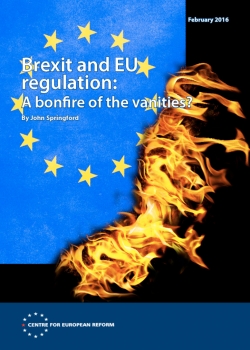
Brexit and EU regulation: A bonfire of the vanities?
Summary: Five sceptical charts on the stifling effects of EU regulation
When asked to name a potential upside to leaving the EU, many British business leaders point to the cost of EU regulation. Critics of the EU also argue that 'social Europe' – the EU's attempt to impose minimum standards on working conditions – has imposed unnecessary burdens on British employers, and that the European Commission's impact assessments are biased in favour of proposed rules. For some eurosceptics, the costs of red tape emanating from Brussels outweigh the benefits of membership of the single market. Are they right?
There can be no doubt that some EU rules impose more costs than benefits. But two conditions must be satisfied to demonstrate that Brexit would lead to better regulation and improved economic performance. First, that the aggregate costs of EU regulations re larger than the benefits, and second, that Britain would not impose such regulations if it left the EU.
Rules at the EU level are designed to create common standards in order to make products more tradable: a lawnmower made in the UK can be sold in Germany without having to be manufactured according to German specifications, for example. Chart 1 shows the overall level of product market regulation for the UK, the EU-15, the newer EU states, and the rest of the OECD. EU rules do not appear to impose rigid harmonisation on the union as a whole: under EU directives, member-states are able to impose higher standards on their own firms if they wish, and over time, the level of regulation in other member-states has converged on Britain’s liberal approach, rather than the other way round. It is hard to argue that Britain’s product and services markets are highly regulated as a result of EU membership.

A broadly similar story emerges over the EU's regulation of labour markets. The OECD’s indicators of labour market protection – rules that make it harder to dismiss workers – also show a wide dispersion across the Union (Chart 2). Britain’s EU membership has not prevented it from having one of the most flexible labour markets in the world, which is one reason why unemployment remained relatively low in the recession following the 2008 financial crisis. The OECD data show that British workers have a low level of protection that is more similar to Anglophone countries than to other EU member-states.

Nonetheless, the EU has attempted to regulate working conditions. Two totemic EU directives, which regulate working time and agency workers, have particularly antagonised British conservatives. A respectable case can be made that such EU rules violate the principle of subsidiarity – there is little evidence that working conditions have been eroded as the result of competition between member-states, which might justify action at the European level. But the two directives have had surprisingly little impact on the British labour market. British workers are able to opt out of the Working Time Directive and work more than the mandated 48 hours per week if they wish. As Chart 3 shows, at most, 1.5 per cent of workers – those working 48 hours a week – might be constrained from working longer hours. It follows that if Britain left the EU and abolished working time rules, the resulting boost to hours worked and national income would be modest.

The other bugbear, the Agency Workers Directive, has also had a surprisingly modest impact. The rules, which came into force in 2011, give employment agency workers the right to the same pay, holidays and working conditions as equivalent permanent workers once they have worked for the same company for 12 weeks. Before it came into force, businesses and the Conservative leadership warned that it would make companies less willing to take on agency temps. But Chart 4 shows that agency employment continued to climb after the rules came into force. By 2014, the proportion of temporary workers who found work through an agency had grown from 19 to 20 per cent: the regulations did not lead employers to switch from agency temps to other temporary workers. The chart also shows that businesses continued to make use of a loophole that allows an exemption from the right to equal pay if workers are formally employed by the agency, not the company they are working for. Two-thirds of agency workers were employed by agencies, not employers. The largest potential cost of the regulations – equal pay – therefore only applies to a minority of agency temps.

All this suggests that the most valid criticism one can make of the Working Time and Agency Workers directives is that, thanks to opt outs and loopholes, they fail to meet their stated objectives.
Alongside its labour and product market indices, the OECD has compiled an index of the quality of countries’ regulatory regimes (Chart 5). Open Europe, a think-tank close to the Conservative party, has argued that after conducting impact assessments, the EU fails to drop many of its proposed laws, and that the quality of the assessments are poor. But the OECD tested the European Commission’s rule-making process alongside other countries, and found that it is of better quality than the OECD average – and similar to that of UK and Australia, which the OECD ranks highest. There can be little doubt that some proposals are forced through the EU’s legislative machinery without proper assessment of the potential costs, but it is far from clear, on the basis of the OECD’s index at least, that the EU does this more than the UK itself.

It appears, then, that Britain would not be able to engineer a boost to growth and employment by abolishing EU rules. And this is all the more apparent when one considers the trade-off at the heart of the Brexit question: that, in order to maintain access to the EU’s single market, the UK would have to sign up to the relevant EU laws. A single market differs from a free trade agreement because it seeks to tackle barriers to trade that arise from diverse national regulations. And, as a result, the European Commission has insisted that Turkey, Norway and Switzerland, which have different degrees of single market access, sign up to the relevant parts of the acquis communitaire. A post-Brexit bonfire of EU rules would hardly be enough to warm a pot of tea.
John Springford is a senior research fellow at the Centre for European Reform.

